Fleurs du Mal Magazine


Or see the index
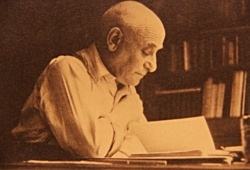
Max Jacob
(1876 – 1944)
Adieux
Le canapé des deux bras tendus pour les adieux ! L’autre canapé, dos, celui des paupières rougies sur un coussin ! L’officier de spahis de l’aquarelle va de l’un à l’autre et la dame en velours noir en sens inverse. L’aquarelle n’est pas achevée. Celui qui m’enseigna cette horreur, les haines souriantes et les silences méprisants me dit : « Avant d’aller à Longchamp il faudra que j’achète à ma femme une bouteille de Bordeaux pour que je ne l’accompagne pas ». Et l’on jouait derrière le mur les grelots de Beethoven de la sonate : les Adieux! Adieux de ma jeunesse, quels espoirs et quels désespoirs près du vieux pont près de l’Enseigne marron qui surplombe la rivière de ses lettres blanches : Liqueurs, Vins, Spiritueux en tous genres. Quels troubles et quelles amertumes dans ces départs vers la misère interrompue. Reste le témoin de tous mes adieux.
Aquarelle inachevée et vous grelots de Beethoven redites-moi ces Adieux ! ceux que je fais au monde pour toujours sans doute.
La lune est morte ; elle ressuscite ; le soleil se couche et se lève. Quand il se couche, c’est une fête pour tous les démons de la nuit, ils allument des feux de Bengale dans le ciel et sur les glaciers. Quand il se lève, ce sont les anges qui apportent les rideaux afin qu’il fasse sa toilette dans les fleuves et son entrée dans les palais. La lune ne meurt qu’une fois par mois et chaque fois c’est un deuil complet.
*
La littérature chandail le style à la cuve.
*
Le paysan vient voir son père de quatre-vingt-trois ans, qui a fait une chute et a tout un côté paralysé :
— Je ne t’ai jamais rien appris et tu sais tout faire. Eh ! bien, ma montre : j’peux pas me retourner, j’peux plus voir l’heure. Accroche-la moi au mur, plante un clou près de ma tête. Là… Est-il bien solide, ton clou ?
— Tu peux y mettre cent kilos que le clou ne era pas.
— S’il peut porter cent kilos, il pourra bien porter une montre. J’aime bien ce qui est solide.
Ceci dit, il ferma les yeux et mourut.
*
Un critique bienveillant affirme que les héros de M’X… l’écrivain ont les trois dimensions. Moi, je prétends que s’ils n’ont pas la quatrième ils n’existent pas.
*
Pour toucher les hommes il faut être un homme. N.S.J.C. a créé et pratiqué cette vérité.
Les voici bien ! mais transfigurés par un séjour entre les livres.
*
Encore un peu plus bas ! plus au fond ! là, maintenant éloigne-les ! place-les au-dessus.
Dans le fameux tableau : la Justice et la Vengeance poursuivant le Crime, l’une des figures célestes tient une lampe à abat-jour vert, l’autre essaie d’ouvrir un parapluie malgré le vent.
*
Les enterrements fréquents sont les lieux où la ville entière se réunit et où se manifestent dans les cortèges les sympathies et naissent les antipathies.
Moïse B… est marié. Sa femme est partie après trois mois de mariage. La belle-mère seule compte dans la maison. Le fils était toujours près de sa mère, jamais avec sa femme.
*
On appelle éphémères des insectes qui ne peuvent ni se nourrir ni vivre n’ayant ni bouche, ni estomac.
#
Ne pas laisser les vaches dans le pâtis. Elles ont vite fait en un jour de le gâcher, de le manger, le fouler ; mais diviser le pâtis en parties, les enfermer dans un coin grillagé, le lendemain dans un autre. Les coins se refont et on remet ça la semaine suivante.
*
Jean emmène Jules voir sa fille à Paris dans son auto. Sa femme intervient : elle ne veut pas, fait observer que sa fille est en examen. Nous revoyons Jules très tenté, il donne en échange (car rien pour rien à la campagne) des légumes pour Germaine qui sera ravie.
C’est servi, les hommes ! si vous voulez boire maintenant, c’est le moment (propos de la femme du camionneur à des porteurs).
*
Dites-donc ! jeune homme ! Vous ne pourriez déranger votre cheval, on ne va pas pouvoir sortir de mon établissement —
Je suis autorisé à aller cueillir des artichauts dans le jardin du propriétaire. C’est une fête, une récréation, un régal.
*
Grand nombre d’alouettes dans les alentours de Jargeau. Jean Fraysse m’apprend que les alouettes pour sauver leurs petits font semblant d’aller les rejoindre ailleurs qu’ils ne sont. Le chasseur les suit. Les perdrix font de même. Samuel Buder fait allusion à ce fait dans ses aphorismes sur le mensonge quand il dit le mensonge naturel à l’univers.
Mr Lehman est un ancien gardien de la paix et huissier de ministre. Il raconte comme un cantonnier fit tant de barouf dans une antichambre qu’il obtint de Briand ce qu’il voulut.
Mme M… dont le mari est un ancien ouvrier sabotier devenu millionnaire.
« Ce Laval n’était jamais qu’un parvenu. »
La même ayant dit à une fille qu’elle était la fille
d’une cuisinière, celle-ci lui répondit : « Eh ! bien !
vous ne seriez pas même foutue de cuire un œuf à la
coque. »
*
Il salua la foule qui le fixait et une fois à terre fit une quête dans toutes les maisons. Le soir il était ivre mort.
Ces maisons au bord des fossés, quelle verdure, arbres et jardins ! Habiter là ! voir en se levant ces fruits, ces fleurs, ces oiseaux. Voilà où j’ai perdu ma matinée.
M’ Ch… à qui j’ai demandé la maison de la morte, m’a indiqué la maison de sa famille à lui soit avec intention soit parce que chacun est si préoccupé de soi-même, qu’il ne pense pas qu’autrui puisse penser à autre chose. Ces troix vieux ne pensent qu’à leur jardin et comme je les comprends. Nouvelles des uns et des autres, chacun parle de ses maladies et ne parle pas d’autre chose. Ici les gens ne vieillissent pas et se portent bien.
La maison de la morte ! il y a là une morte ? Les peupliers chantent, une barque était sur l’eau des fossés. « Non ! je ne voulais pas qu’on fasse le circuit dans mon atelier ! mes ouvriers le font en face ! “De la morte, pas question !” Il était temps qu’elle s’en aille. On n’a pas le droit de désirer la mort de quelqu’un, mais il valait mieux pour elle et pour tout le monde qu’elle s’en aille. » Et puis on a parlé « âges », « sciati-ques », « mariages », « naissances ». Et me revoici sous la pluie avec le souvenir de cet atelier de menuisier, cette odeur de bois frais, ces planches de bois précieux, ces jolis vieux meubles à réparer, ces meubles neufs pas encore colorés, les copeaux à terre. Les murs sont antiques avec des poutres rejointes par de la chaux, poutres tordues, grimaçantes et des recoins mystérieux. Dehors la verdure et les peupliers qui chantent. C’est tout au bout du bourg céleste. L’après-midi le fils promenait en toilette d’enterrement d’ailleurs des triangles de bois sculptés…
Les hommes qui disent le plus de mal des femmes sont ceux qui les ont le plus pratiquées. Ceux qui les respectent, trop seuls, en disent du bien. Ils ont raison.
*
Max Jacob poetry
fleursdumal.nl magazine
More in: Archive I-J, Jacob, Max, REPRESSION OF WRITERS, JOURNALISTS & ARTISTS
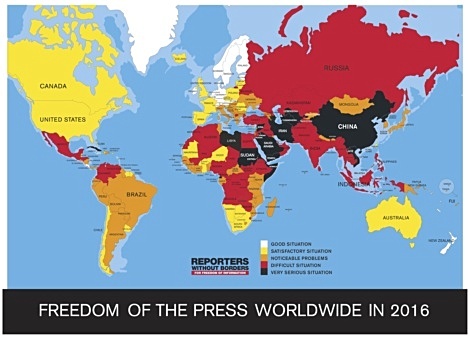
For 23 years now, the Bayeux-Calvados Award for war correspondents has for objective to give the floor to those who help us get a better understanding of the world: war correspondents. It is with a tremendous satisfaction that we have observed a growing and enlightened public over the years. Today, within a complicated and tensed national and international context, this week of reflection is, more than ever, necessary.
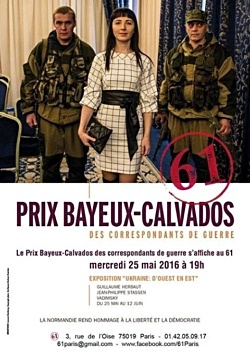 REPORTERS SANS FRONTIÈRES / REPORTERS WITHOUT BORDERS
REPORTERS SANS FRONTIÈRES / REPORTERS WITHOUT BORDERS
Major crises are reaching the planet and the Bayeux-Calvados Award for war correspondents is, once again, shedding the light on the upheaval of our time. Far from trying to upset the viewers, the photographs displayed within the exhibitions are here for people to think: the consequences of the conflict in Syria, the crisis of refugees, the movement of populations, criminality that, in Mexico, is turning into an armed conflict… A sound exhibition, never heard before, created in association with the French radio France Inter will pay tribute to radio reporters present in the theatres of war. The meetings of the Bayeux-Calvados Award will also shed a light on conflicts that have been forgotten and will allow the viewers time to reflect, in the midst of the news that is often misrepresented. A long list of rendez-vous where professionals ever so numerous and a faithful public will be able to exchange, share and enhance their knowledge of the world.
During the 2016 edition, student actions – which includes the Regional prize for students and trainees of Normandy and the Bayeux-Calvados Award classes- are expending to the entire region of Normandy. Today, media literacy is more than a duty, it’s a necessity. Film screenings for secondary school students, viewpoint of 15 year-olds and meetings between students and professionals are at the heart of the Bayeux-Calvados Award.
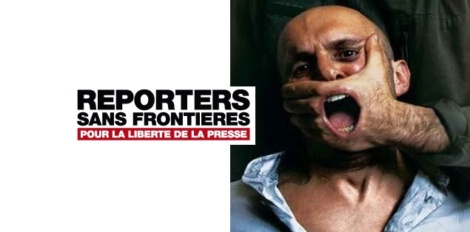
For the last 23 years, the Bayeux – Calvados Award for War Correspondents has been bringing together international journalists from the field to meet the public, tell human stories and provide explanation and background to areas of tension around the world.
Next edition of the Bayeux – Calvados Award for war correspondents will be taking place from 3 to 9 October 2016 in Bayeux FR.
Jean – Claude Guillebaud, a major figure in journalism as a writer and former war correspondent, will serve as President of the Jury for this 23rd edition.
A week of meetings on international news On the program for october: original exhibitions, debate evenings, screenings, book fair, events for schools… The Bayeux Calvados award is also a week of meetings, exchanges between the public and reporter s. Unique times on international news which constitutes the strength of the Bayeux Calvados award meetings. A real public plebiscite. Journalists : you have from now until 6 June to send us your work Photo, radio, television and written press reports on a conflict or news event relating to the fight for freedom and democracy mus t be submitted before the 6 th June to be considered for the 2016 selection. They must have been made between the 1st June 2015 and the 31st May 2016. There is a €7,000 grant to be won in each category.
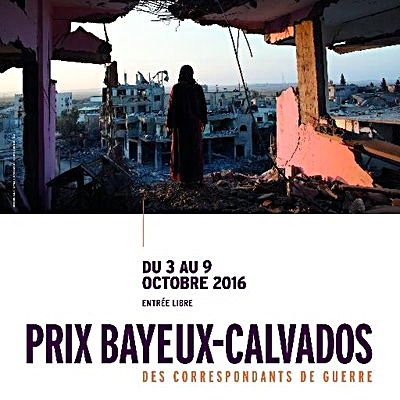
The meeting takes place from 3 to 9 October along with special correspondents, women and men of the ground, who, through their evidence, wake up our senses
# more information on website Prix Bayeux – Calvados (des correspondents de guerre)
# more information on Reporters without Borders
fleursdumal.nl magazine
More in: AUDIO, CINEMA, RADIO & TV, DICTIONARY OF IDEAS, MUSEUM OF PUBLIC PROTEST, PRESS & PUBLISHING, REPRESSION OF WRITERS, JOURNALISTS & ARTISTS, WAR & PEACE
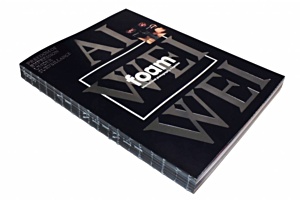 Foam Magazine #43: Ai Weiwei – Freedom of Expression under Surveillance
Foam Magazine #43: Ai Weiwei – Freedom of Expression under Surveillance
Foam is proud to launch the brand new and unique Foam Magazine, which was made in close collaboration with world-renowned Chinese contemporary artist and activist Ai Weiwei (1957, Beijing). Weiwei is guest editor for this issue that is entirely dedicated to the theme ‘Freedom of Expression under Surveillance’. Ai Weiwei himself is the central point of the magazine, as an artist under constant surveillance by the Chinese government. The magazine contains images he made while documenting his life by using Instagram and webcams, but also pays attention to Ai Weiwei’s constant endeavour to keep a sharp eye on the ones surveilling him.
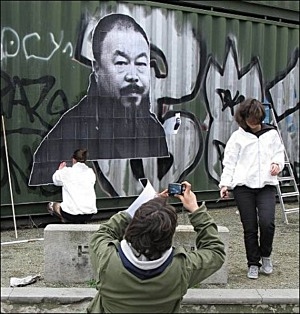 Freedom of Expression under Surveillance
Freedom of Expression under Surveillance
Containing an interview with, and quotes by the artist Foam Magazine #43 is divided into four parts: ‘Sousveillance”, ‘Self Surveillance’, ‘Urban Surveillance’ and ‘Art and Surveillance’. It reports on the way the artist worked the last few years. Instagram and Twitter became the means by which Ai Weiwei shared virtually every aspect of his life with a steadily growing multitude of followers all over the world. Part of the issue shows a selection of the endless stream of images posted on Instagram by Ai Weiwei. In another part Weiwei shares stills from the ‘Weiweicam’ he directed at himself 24/7. Foam Magazine #43 documents crucial and highly eventful period in the life of one of the most important artists of our age.
About Ai Weiwei
Ai Weiwei is an influential Chinese contemporary artist and activist. As a political activist, he has been openly criticizing the Chinese Government’s stance on democracy and human rights. In 2011, following his arrest at Beijing Capital International Airport he was held for 81 days without any official charges being filed. Recently he had his passport returned to him and was given the opportunity to travel abroad. Among art works by Ai Weiwei are Fairytale (2007), produced for Documenta 12, and Sunflower Seeds, an installation in London’s Tate Modern in 2010. A major solo exhibition of his work is currently on show at the Royal Academy of Arts, London.
ISBN 9789491727825
Published December 2015
288 pages + 4 cover pages front + back
Printed on selected specialized paper
Swiss bound
300x230x25 mm
€22,50
# More information: www.foam.org
Photo Anton K. (FdM): Protest in Berlin, Linienstrasse, 2011
fleursdumal.nl magazine
More in: - Book News, Ai Weiwei, Art & Literature News, Art Criticism, MUSEUM OF PUBLIC PROTEST, Photography, REPRESSION OF WRITERS, JOURNALISTS & ARTISTS
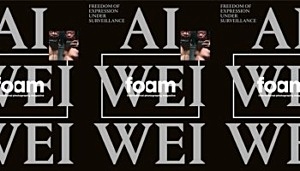 Ai Weiwei – #SafePassage
Ai Weiwei – #SafePassage
16 september – 7 december 2016
Dit najaar presenteert Foam #SafePassage, een tentoonstelling van het werk van de Chinese kunstenaar en activist Ai Weiwei (1957, Beijing). Omdat de kunstenaar zelf lange tijd constant in de gaten werd gehouden door de Chinese overheid, ervaart hij een persoonlijke verbondenheid met de groeiende stroom vluchtelingen die Europa probeert binnen te komen.
Sinds zijn eerste bezoek aan het Griekse eiland Lesbos, in december 2015, bezocht Ai Weiwei met zijn team tal van vluchtelingenkampen rond de Middellandse Zee, onder andere in Syrië, Turkije, Israël en Frankrijk. De tentoonstelling gaat over de strijd tussen het individu en de machtsstructuren die de samenleving domineren. Centraal staan zowel de ervaringen die Ai Weiwei ertoe hebben gebracht zijn vaderland te verlaten, als die van honderdduizenden vluchtelingen en migranten die hun leven blijven riskeren om Europa te bereiken, vaak met als enige resultaat dat zij voor gesloten grenzen komen te staan.
 Ai Weiwei
Ai Weiwei
Ai Weiwei, die als belangrijkste Chinese kunstenaar, ontwerper en curator van dit moment wordt beschouwd, is een vooraanstaand sociaal en cultureel commentator. Hij is een voorvechter van mensenrechten en democratie en levert onvermoeibaar en ongezouten kritiek op het politieke stelsel in China. Hij heeft herhaaldelijk onderzoek gedaan naar overheidscorruptie en doofpot affaires, waardoor hij een voortdurende doorn in het oog is van de Chinese autoriteiten. Na zijn arrestatie op de internationale luchthaven van Beijing in 2011 werd hij 81 dagen lang in het geheim gevangen gehouden, zonder dat er ooit officieel een aanklacht tegen hem was ingediend. Tijdens zijn gevangenschap werd hij continu verhoord en 24 uur per dag geobserveerd. Hij verkeerde in het gezelschap van twee bewakers die nooit van zijn zijde weken, zelfs niet als hij naar het toilet ging of sliep. Na zijn vrijlating werd zijn paspoort in beslag genomen en werd hij gedwongen om in te China blijven, waar de autoriteiten hem nauwlettend in de gaten bleven houden.
Tijdens de continue bewaking trachtte Ai Weiwei de situatie zoveel mogelijk in eigen hand te houden en zich op allerlei manieren te onttrekken aan de onophoudelijke inbreuken op zijn privacy. Hij startte een reeks experimenten, variërend van een livestream van zijn dagelijks leven via vier webcams in zijn atelier die wereldwijd kon worden bekeken op de website weiweicam.com, tot het bijhouden van een blog – totdat de overheid ingreep en hem beide mogelijkheden ontnam. Foam Magazine #43, dat in december 2015 verscheen, was volledig gewijd aan het thema ‘Freedom of Expression under Surveillance’ (‘vrijheid van expressie onder toezicht’). Ai Weiwei, die zelf als gastredacteur fungeerde en centraal stond in dit nummer, deed daarin uitgebreid verslag van deze belangrijke en donkere periode in zijn leven.
Tentoonstelling
De tentoonstelling begint met werken die een afspiegeling vormen van de persoonlijke ervaringen van de kunstenaar terwijl hij onder voortdurend toezicht stond, zoals is beschreven in Foam Magazine #43. In 2015 kreeg Ai uiteindelijk zijn paspoort terug. Kort daarna vertrok hij naar Europa en vestigde zich in Berlijn, waar hij nu zijn atelier heeft. Nog altijd hanteert hij de strategie van ultieme zelfbewaking, in de vorm van een vrijwel continue stroom beelden die hij op Instagram plaatst. Zo kan iedereen met een internetverbinding hem van dag tot dag volgen. Sinds zijn eerste bezoek aan het Griekse eiland Lesbos, in december 2015, fungeren zijn Instagram-beelden als een soort realtime nieuwsblog van de reizen van zijn team langs de vluchtelingenkampen in het Middellandse Zeegebied. Als tweede deel van de tentoonstelling worden de wanden van Foam vol gehangen met duizenden foto’s die hij met zijn mobieltje heeft gemaakt. Het zijn overwegend spontane kiekjes die een goede indruk geven van de leefomstandigheden in de kampen. Deze immense collage geeft uitdrukking aan de talloze persoonlijke ontmoetingen die de kunstenaar had met mensen in de vluchtelingenkampen, waardoor de omvang van de crisis nog eens pijnlijk wordt benadrukt. Ai Weiwei’s beelden gaan vergezeld van een selectie uit zijn inmiddels legendarische serie marmeren beelden en een aantal van zijn video’s, waaronder: Chang’an Boulevard (2004), dat een beeld schetst van de weg die Beijing langs een oost-west as in tweeën deelt en On the Boat (2016), waarin we de kunstenaar zien op een achtergelaten boot midden op de oceaan.
Ai Weiwei is vooral bekend om zijn sculpturen en omvangrijke installaties, waarmee hij conceptueel een verbinding legt tussen traditionele cultuurgebonden ambachten en hedendaagse politieke boodschappen. Daarbij brengt hij een relatie tot stand tussen historische wortels, materialen en paradigma’s, en actuele vraagstukken in onze moderne maatschappij. Ai heeft overal ter wereld grote tentoonstellingen en paviljoens ingericht, maar daarnaast is hij ook architect, schrijver, cineast, filosoof en politiek activist. Weiwei’s activiteiten zijn onlosmakelijk verbonden met de staat van de hedendaagse Chinese kunst en maatschappij – of het nu gaat om samenwerking met het Zwitserse architectenbureau Herzog & de Meuron, dat hij met artistieke adviezen terzijde stond bij de bouw van het nationale stadion van Beijing voor de Olympische Spelen van 2008, of om zijn onderzoek naar corruptie bij de Chinese overheid.
De tentoonstelling wordt geopend op donderdag 15 september, vanaf half 6, in het bijzijn van de kunstenaar.
Foam
Keizersgracht 609
1017 DS Amsterdam
+31 20 5516500
foam.org
# Meer informatie: www.foam.org
Photo Anton K. (FdM): Protest in Berlin, Linienstrasse, 2011
fleursdumal.nl magazine
More in: Ai Weiwei, Anton K. Photos & Observations, Art & Literature News, Exhibition Archive, MUSEUM OF PUBLIC PROTEST, Photography, REPRESSION OF WRITERS, JOURNALISTS & ARTISTS, Sculpture
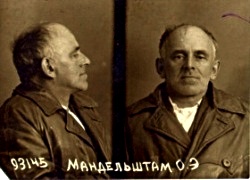
Osip Mandelstam
(1891-1938)
I detest the light…
I detest the light
Of tedious stars.
Hello, my old delirium,
The tower’s crenellated pinnacle!
Stone, turn to lace
Become a spider’s web,
With your thin needle, wound
The empty breast of the sky.
My own turn will come,
I feel the stretching of my wings.
But where will the arrow
Of living thought fly?
Perhaps having used up my path,
And my time, I will come back:
– There I could not love,
– Here I fear to love . . .
1912

Osip Mandelstam poetry
Transl. J.A. Woolf
fleursdumal.nl magazine
More in: Archive M-N, J.A. Woolf, Mandelstam, Osip, REPRESSION OF WRITERS, JOURNALISTS & ARTISTS, Woolf, J.A.
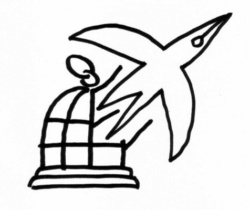
Een vrouwentepel op Facebook, het levenloze lichaam van een kind op een strand, rondvliegende ledematen in een cartoon als reactie op een aanslag of een speech van een man die het einde van het Westen propageert. Iedereen is voor het vrije woord, toch? Als het vrije woord ons pijn doet zijn we al snel wat minder enthousiast. Omdat je iets mag zeggen, moeten we het dan ook doen? Bestaat er een ‘Red Line’? Kunnen we nog wel zeggen wat we willen? Wie bepaalt wat smakeloos of scherp is? Welke invloed hebben bedrijven als Facebook en Twitter op het vrije woord? En beschermt de overheid het vrije woord of is zij juist een bedreiging op het recht op meningsuiting?
De Balie – Amsterdam
Podium / di 3 mei 2016 / 19:30
Festival van het Vrije Woord
ikv – Internationale Dag van de Persvrijheid
Op 3 mei, op de Internationale Dag van de Persvrijheid, gaan we in debat over de ‘Red Line’ van het vrije woord tijdens het Festival van het Vrije Woord. Deze avond spreken we met journalisten uit landen waar persvrijheid niet vanzelfsprekend is, maar discussiëren we ook over de waarden van het vrije woord in Nederland.
 Het programma
Het programma
De Israëlische schrijver Nir Baram is te gast en gaat met Midden-Oosten correspondent Olaf Koens in gesprek over het vrije woord. Free Press Unlimited lanceert de Persvrijheidsmonitor met Fidan Ekiz. Pierre Terdjman vertelt over het fotoproject Dysturb en gaat in op de vraag: wat kun je wel en wat kun je niet laten zien? Is er een ‘Red Line’ voor beeld en zo ja, waar ligt deze? De Chinese journalist Yuan Chang en Nederlandse documentairemaker Ruben Terlou (Langs de oevers van de Yangtze) spreken elkaar over internetvrijheid en (online) journalistiek in China: hoe moeilijk is het om een blogger te zijn in China? Gaat toegang tot Facebook iets veranderen voor de Chinezen?
Naar aanleiding van het boek Blad voor de Mond interviewt Azië-correspondent Michiel Maas journalisten uit Pakistan en Zuid-Soedan, die in Nederland zijn via het Shelter City-programma. Maurits Martijn (De Correspondent), Arjan el Fassed (Open State Foundation) en Daphne van der Kroft (Bits of Freedom) zoomen in op online censuur: hoeveel invloed hebben bedrijven zoals Facebook en Twitter op het vrije woord? Cabaretier André Manuel sluit de avond af met zijn visie op het vrije woord. Journalist en schrijver Leon Verdonschot neemt de presentatie voor het programma in de grote zaal op zich. Deze avond wordt georganiseerd door het Persvrijheidscomité.
Festival van het Vrije Woord
ikv – Internationale Dag van de Persvrijheid
De Balie – Amsterdam
di 3 mei 2016 19:30 – 23:30 Grote Zaal & Salon
Het Persvrijheidscomité bestaat uit de Nederlandse Vereniging van Journalisten (NVJ), NDP Nieuwsmedia, RNW Media, Free Press Unlimited, het Genootschap van Hoofdredacteuren, De Balie, PEN, World Press Photo, het Persmuseum en BKB | Het Campagnebureau.
Festival van het Vrije Woord 2015
In 2015 vond het Festival van het Vrije Woord plaats op zaterdag 2 mei in De Balie. De Persvrijheidslezing werd dat jaar uitgesproken door de Deense cartoonist Kurt Westergaard. Daarnaast waren onder andere ook de Egyptische journalist Abdullah Elshamy, journalisten Rena Netjes en Judith Spiegel, columnist Zihni Özdil, burgemeester Eberhard van der Laan en cabaretier Hans Teeuwen te gast. In de media werd de avond breed uitgemeten. Onder andere Nieuwsuur, NRC, Parool, Trouw, The Post Online, de Groene Amsterdammer, Elsevier en RTL Nieuws besteedden aandacht aan het festival.
Programma 2016 :
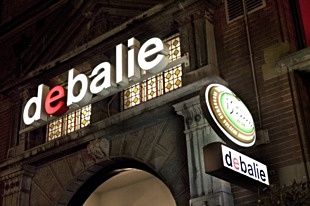 Grote Zaal
Grote Zaal
• Free Press Unlimited onthult de Persvrijheidsmonitor samen met documentairemaker Fidan Ekiz. Ekiz interviewde journalisten die werken onder censuur voor de nieuwe documentaireserie ‘De Pen en het Zwaard’. (NL)
• De Israëlische schrijver Nir Baram gaat in gesprek over het vrije woord met Olaf Koens, Midden-Oosten correspondent en nu gestationeerd in Tel Aviv. Wat zijn hun ervaringen in Israël en in Nederland? (Engels)
• Fotojournalist Pierre Terdjman komt praten over Dysturb: op publieke plekken in steden hangt hij levensgrote foto’s op, om (foto)journalistiek toegankelijk te maken voor een groot publiek. Maar wat kun je wel en niet laten zien? Waar ligt de ‘Red Line’ voor beeld? (Engels)
• Chinese journalist Yuan Chang en documentairemaker Ruben Terlou (‘Langs de oevers van de Yangtze’) gaan in gesprek over internetvrijheid en online journalistiek in China. Hoe moeilijk is het om een blogger te zijn in China? En wat gebeurt er wanneer Facebook voor iedereen in China toegankelijk wordt? (Engels)
• Cabaretier André Manuel sluit het programma in de Grote Zaal af met een show over het vrije woord. Wat kan nog gezegd worden? (NL)
Presentatie door journalist en schrijver Leon Verdonschot.
Salon
• Stichting Röportaj neemt een Turkse en Nederlandse fotograaf mee om in debat te gaan over fotografie en persvrijheid in Turkije. Hoeveel foto’s zoals die van Aylan gaan we nog zien? En hoe wordt beeld in Turkije gecensureerd? (wordt nog aangekondigd)
• Naar aanleiding van het boek ‘Blad voor de Mond’ interviewt Azië-correspondent Michiel Maas journalisten uit Pakistan en Zuid-Soedan, die nu deelnemen aan het Shelter City-programma in Nederland. Waar ligt voor hen de ‘Red Line’ van het vrije woord? (Engels)
• Dominique Weesie (GeenStijl, PowNed) en Anton Dautzenberg bespreken de ‘Red Line’ van het vrije woord in Nederland – wat gebeurt er wanneer je iets zegt/schrijft/publiceert dat buiten de normale kaders valt? (NL)
• Maurits Martijn (De Correspondent), Arjan el Fassed (Open State Foundation) en Daphne van der Kroft (Bits of Freedom) zoomen in op online censuur: hoeveel invloed hebben bedrijven zoals Facebook en Twitter op het vrije woord? En wat is de rol van de overheid hierin? (NL)
Festival van het Vrije Woord
ikv Internationale Dag van de Persvrijheid
De Balie – Amsterdam
di 3 mei 2016 19:30 – 23:30 Grote Zaal & Salon
# meer info op website De Balie Amsterdam
Fotograaf: Jan Boeve / De Balie
fleursdumal.nl magazine
More in: A.H.J. Dautzenberg, Art & Literature News, DICTIONARY OF IDEAS, MUSEUM OF PUBLIC PROTEST, PRESS & PUBLISHING, REPRESSION OF WRITERS, JOURNALISTS & ARTISTS
14.01.2016 – Worldwide Reading of selected poems and other texts in support of Ashraf Fayadh.
The international literature festival Berlin (ilb) calls on all individuals, institutions, schools and media outlets that care about justice and freedom to participate in a worldwide reading of selected poems and other texts in support of Ashraf Fayadh, on 14 January 2016.
Ashraf Fayadh, a 35 year-old Palestinian poet and art curator, who lives in Saudi Arabia, has been sentenced to death by a Saudi court on 17 November 2015 for the “crime” of apostasy. He was denied access to a lawyer throughout his detention and trial.
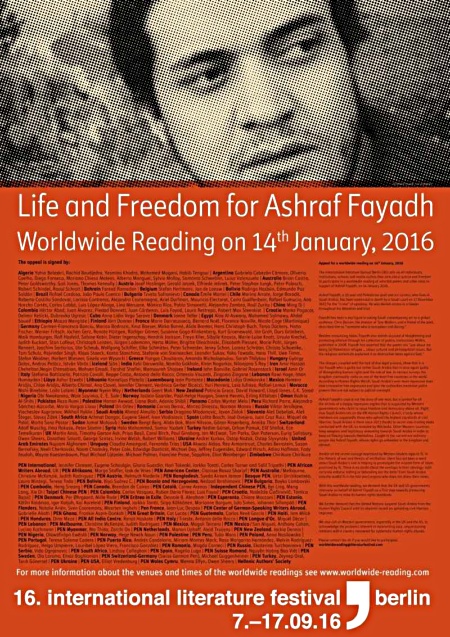
Frida Kahlo’s Moustache
I will ignore the smell of clay, the reproach of rain, and the choke that has long settled in my chest
and I will search for an appropriate condolence of my situation that doesn’t permit me
to explain your lips in the manner I’d hoped for
or to shake dew drops off your reddish petals
or to lessen the intensity of the obsession that overwhelms me whenever I realize
you’re not next to me now and won’t be…I’m forced to justify my position
to the silence that night punishes me with
Pretend that the earth is silent, just as we see it from afar,
and that all what happened between us was no more
than a poor prank that shouldn’t have gone this far
What’s your idea about the days I usually spend without you?
about my words that used to rapidly evaporate
about my heavy pain
and the knots that had sedimented inside my thorax like dried up algae
I forgot to tell you…that in the practical sense of the word
I’ve grown used to your absence
and that my wishes have lost their way to your desires
and my memory has begun to corrode
And that I still chase light, not because I want to see…the dark always frightens
even when we’re used to it
Is my apology for everything that happened while I was trying
to make up excuses for you enough?
Is it enough for the times jealousy raged in some place inside me
or when disappointment ruined yet another of my dark days
And for my repetition that justice will always suffer the disturbances of menstruation
and that love is a backward impotent man at the end of his days
I will be forced to trick my memory
and pretend that I have no problem sleeping
and rip all the remaining questions
the questions that now search for persuasive answers
after all punctuation has been dropped
for purely personal reasons
Let the mirror explain to you how beautiful you are
Remove my pile of dust, my words
Breathe deeply, remember how much I loved you and how
the whole thing turned into a brief electrocution
that almost caused a great fire in an empty warehouse
The sun is extremely polite when it comes to covering her mouth while yawning
The sun doesn’t know how to impose its total control over the earth
the same fate the sun has with darkness, the sun
has no choice but to resist the dark, even if Pluto
has lost its qualifications to remain among the vertiginous planets
The moon has a different take on imposing its will over the sea
And the sea can swallow whatever creatures it desires and lay claim to more land
on account of global warming, the punctured ozone, a woman’s right
to wear a bikini, and the temptation of birds with the riches of fish
I will no longer be pain pills for your monthly period
and won’t enjoy your exceptional conversation while you prepare for a long nap
or when you want to offload your anger
or while you spend some lovely time in a bar packed with lovers of Jazz
I won’t be able to sleep enough or explain Nietzsche’s moustache
or persuade you that Imad’s work is a unique experiment in art
I will busy myself with normalizing relations between earth and water
in order to obstruct fire on its way to becoming an ambassador of good will
Only then will the air cease to appear presentable
as it dries out your underwear on your laundry line
I walk in the street of the inexpressible and question the indifferent rain drops
I try to remove the rust that’s stuck in my throat
How many times should I refer to the wind’s guidebook to decipher your moods?
How many words have I silenced to spare you the smell of disappointment that my American cigarette blows?
I won’t be the piggybank you break whenever you run out of funds
and I won’t include as poetic chore an amorous description of your eyes
because your eyes, in the final analysis, are more fatal than those
that ruined Jareer’s mind, or more poetic than Sayyab’s palm tree groves
Your eyes are precisely the way angels prostrated to Adam,
and I exclude Satan, naturally, for rhetorical reasons
The world this morning resembles my stomach with its ulcers, resembles
the ache that spends its weekends in my head, resembles
the heaps of broken glass that fill my memory
The world is no longer alright since I’ve stopped worrying about glass
or the reply letter to my letter or Mrs. Clinton’s failure to lead the Democratic Party
Don’t look for me, I will be there
with every sip of coffee
and when you relax at a spa, or want to laugh or cry, or if you desire
to toss yourself into someone’s arms, or when you can’t
resist your insomnia or your mobile phone
that didn’t ring during your sleep
or when in the unconsciousness of writing, or when you want to talk
Ashraf Fayadh
Ashraf Fayadh: Frida Kahlo’s Moustache
Translated from the Arabic by Fady Joudah
fleursdumal.nl magazine
More in: Archive E-F, Art & Literature News, Frida Kahlo, REPRESSION OF WRITERS, JOURNALISTS & ARTISTS
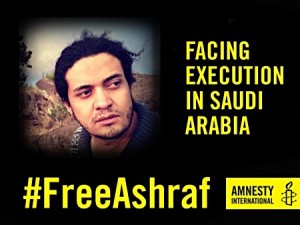 14.01.2016 – Worldwide Reading of selected poems and other texts in support of Ashraf Fayadh.
14.01.2016 – Worldwide Reading of selected poems and other texts in support of Ashraf Fayadh.
The international literature festival Berlin (ilb) calls on all individuals, institutions, schools and media outlets that care about justice and freedom to participate in a worldwide reading of selected poems and other texts in support of Ashraf Fayadh, on 14 January 2016.
Ashraf Fayadh, a 35 year-old Palestinian poet and art curator, who lives in Saudi Arabia, has been sentenced to death by a Saudi court on 17 November 2015 for the “crime” of apostasy. He was denied access to a lawyer throughout his detention and trial.
Fayadh has been a key figure in taking Saudi contemporary art to a global audience. Chris Dercon, the director of Tate Modern, and a friend of the poet, described him as “someone who is outspoken and daring.”
Besides renouncing Islam, Fayadh also stands accused of blaspheming and promoting atheism through his collection of poetry, Instructions Within, published in 2008. Fayadh has asserted that the poems are “just about me being [a] Palestinian refugee … about cultural and philosophical issues. But the religious extremists explained it as destructive ideas against God.”
The charges, coupled with the lack of due legal process, show that it is not Fayadh who is guilty but rather Saudi Arabia that is once again guilty of disregarding human rights and the rule of law. In various surveys the kingdom continually ranks as one of the least free countries in the world. According to Human Rights Watch, Saudi Arabia’s ever more repressive laws now criminalize free expression and give the authorities excessive police powers that are not subject to judicial oversight.
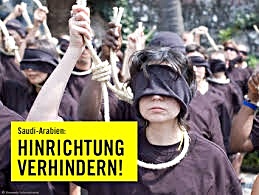 Ashraf Fayadh’s case is not the story of one man, but a symbol for all the victims of a deeply repressive regime that is supported by Western governments who claim to value freedom and democracy above all. Right now Saudi Arabia sits on the UN Human Rights Council, a body whose members are supposedly those who uphold the highest standards of civil liberties. Saudi Arabia is there since 2013 thanks to secret vote-trading deals conducted with the UK, as revealed by Wikileaks. Other Western countries keep weapons and legitimacy streaming towards Saudi Arabia in order to keep oil flowing towards themselves. Caught in the current are ordinary people like Ashraf Fayadh, whose rights go unheeded in the kingdom and abroad.
Ashraf Fayadh’s case is not the story of one man, but a symbol for all the victims of a deeply repressive regime that is supported by Western governments who claim to value freedom and democracy above all. Right now Saudi Arabia sits on the UN Human Rights Council, a body whose members are supposedly those who uphold the highest standards of civil liberties. Saudi Arabia is there since 2013 thanks to secret vote-trading deals conducted with the UK, as revealed by Wikileaks. Other Western countries keep weapons and legitimacy streaming towards Saudi Arabia in order to keep oil flowing towards themselves. Caught in the current are ordinary people like Ashraf Fayadh, whose rights go unheeded in the kingdom and abroad.
Amidst all the recent outrage expressed by Western leaders against IS, in the rhetoric of war and threats of retribution, there has not been a word about Saudi Arabia’s role in helping to promulgate the virulent form of Islam practiced by IS. There is no doubt about the overlaps in their ideology: both certainly endorse lashing or beheading (on the latter front Saudi Arabia actually outdid IS in the last year) anyone who does not share their views.
With this worldwide reading, we demand that the UK and US governments intervene on behalf of Ashraf Fayadh as a first step towards pressuring Saudi Arabia to raise its human rights standards.
We further demand that the United Nations suspend Saudi Arabia from the Human Rights Council until its abysmal record on upholding civil liberties improves.
We also call on Western governments, especially in the UK and the US, to acknowledge the problems inherent in maintaining cozy, unquestioning relations with a country renowned for systematic human rights abuses.
# Website International Literature Festival Berlin 2016
fleursdumal.nl magazine
More in: Archive E-F, Art & Literature News, FDM in Berlin, REPRESSION OF WRITERS, JOURNALISTS & ARTISTS
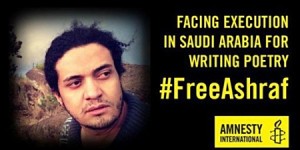 Ashraf Fayadh, a 35-year-old poet and artist, is sentenced to be executed by Saudi Arabian authorities for his art. On 17 November, the General Court in Abha, southwest Saudi Arabia, found Ashraf guilty of ‘apostasy’ – renouncing Islam – for his poetry and sentenced him to death.
Ashraf Fayadh, a 35-year-old poet and artist, is sentenced to be executed by Saudi Arabian authorities for his art. On 17 November, the General Court in Abha, southwest Saudi Arabia, found Ashraf guilty of ‘apostasy’ – renouncing Islam – for his poetry and sentenced him to death.
Arrested for poetry and pictures on his phone: Ashraf was initially arrested on 6 August 2013 following a complaint registered against him by another Saudi citizen, who said that the poet was promoting atheism and spreading blasphemous ideas among young people. Ashraf was released the following day, but then rearrested on 1 January 2014, when he was charged with apostasy – he had supposedly questioned religion and spread atheist thought with his poetry. He was at the same time charged with violating the country’s Anti-Cyber Crime Law for allegedly taking and storing photos of women on his phone.
On 30 April 2014, Ashraf was sentenced to four years in prison and 800 lashes for the charges relating to images of women on his phone. The General Court accepted Ashraf’s apology for the charges of apostasy and found the punishment to be satisfactory. However, the court of appeal recommended that Ashraf should still be sentenced for apostasy, and his case was sent back to the General Court, which in turn sentenced him to death for apostasy. Throughout this whole process, Ashraf was denied access to a lawyer – a clear violation of international human rights law, as well as Saudi Arabia’s national laws.
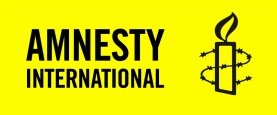 A death sentence for ‘apostasy’: Apostasy (Riddah, in Arabic) is the renouncing of Islam. Saudi Arabia follows Sharia (Islamic) law, and ‘apostasy’ can be punishable by death. Yet ‘apostasy’ is not a crime – it is a violation of someone’s right to belief or choose our own religion. It should never incur punishment. In addition to that, the death penalty, according to international law, may only be used for the ‘most serious crimes’ (recently interpreted by UN experts to refer to ‘intentional killing’). Apostasy is not a crime at all, let alone a serious one.
A death sentence for ‘apostasy’: Apostasy (Riddah, in Arabic) is the renouncing of Islam. Saudi Arabia follows Sharia (Islamic) law, and ‘apostasy’ can be punishable by death. Yet ‘apostasy’ is not a crime – it is a violation of someone’s right to belief or choose our own religion. It should never incur punishment. In addition to that, the death penalty, according to international law, may only be used for the ‘most serious crimes’ (recently interpreted by UN experts to refer to ‘intentional killing’). Apostasy is not a crime at all, let alone a serious one.
The death penalty is a cruel, inhuman and degrading punishment – it violates our right to life and our right to be free from torture. At Amnesty, we believe the death penalty should never be used.
Quite simply, we’re calling for Ashraf to be freed. He has committed no crime, and as such should not be imprisoned, let alone face execution.
We’re asking the Saudi Arabian authorities to drop Ashraf’s conviction and all charges against him. We’re also asking for them to stop executing anyone for ‘apostasy’.
# Source: Amnesty International website (sign petition!)
fleursdumal.nl digital magazine
More in: Archive E-F, Art & Literature News, POETRY ARCHIVE, REPRESSION OF WRITERS, JOURNALISTS & ARTISTS
Jo Glanville: The Charlie Hebdo principle (PEN director Jo Glanville responds to the withdrawal of six writers from PEN American Center’s annual gala over their decision to honour Charlie Hedbo)
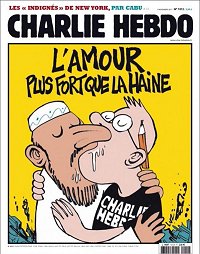 The distaste of eminent writers such as Peter Carey at PEN American Center’s decision to honour Charlie Hebdo at its gala next month, highlights once again the fundamental inconsistency that underpins attitudes towards free speech. Within days of the ‘Je Suis Charlie’ outpouring of solidarity, French police were arresting citizens for glorifying terrorism, while David Cameron’s government was busy pushing a counter terrorism bill through Parliament that would severely curtail universities’ liberty as a forum for freedom of expression. We may be used to the double standards of politicians, but what about writers?
The distaste of eminent writers such as Peter Carey at PEN American Center’s decision to honour Charlie Hebdo at its gala next month, highlights once again the fundamental inconsistency that underpins attitudes towards free speech. Within days of the ‘Je Suis Charlie’ outpouring of solidarity, French police were arresting citizens for glorifying terrorism, while David Cameron’s government was busy pushing a counter terrorism bill through Parliament that would severely curtail universities’ liberty as a forum for freedom of expression. We may be used to the double standards of politicians, but what about writers?
Becoming a member of PEN (one of the oldest human rights organisations in the world, and the largest international community of writers) means pledging ‘to oppose any form of suppression of freedom of expression in the country and community to which [writers] belong, as well as throughout the world wherever this is possible’. That’s a sentiment one would hope any writer might be happy to support and PEN depends, on a regular basis, on its members speaking out and standing up for fellow writers at risk. That’s the source of its influence and moral authority.
One of the writers, Francine Prose, a former PEN President, who decided to withdraw from the gala in protest, was reported as saying that giving an award signified ‘admiration and respect’ for the winner’s work. ‘I couldn’t imagine being in the audience when they have a standing ovation for Charlie Hebdo.’ But Charlie Hebdo is in fact being recognised for its courage: the courage to publish in the face of threats and intimidation, and the courage to continue publishing after the shocking murders in January.
We are more used to seeing that courage at a greater distance – in Mexico, Russia, Bangladesh or Egypt – and feel safe celebrating writers and journalists who may be prosecuted for outraging public morals in their own culture.
On our own doorstep, when faced with a satirical publication that provokes and offends, there is an underlying view implicit in the protest of Peter Carey and fellow writers that this kind of speech is not worth defending. Carey questioned whether it even was a freedom of expression issue; the writer Deborah Eisenberg voiced concerns (as have many others) about Charlie Hebdo’s ‘denigrating portrayals of Muslims’. Yet one of the most important, if uncomfortable, responsibilities for any free speech advocate is to defend the right to express speech which may be shocking, disturbing or offensive. Without that broad defence, the limits of everyone’s speech, as well as writers and publishers, are at risk of being restricted to suit the political agenda or prevailing morality, at a cost to artistic licence as well as individual freedom.
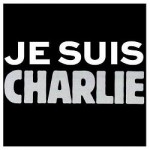 Most of the great free speech battles in history have been fought over issues that were not deemed deserving of defence. The subjects of the famous obscenity prosecutions of the 70s in the UK (the Oz trial or Linda Lovelace’s memoir) were seen as publications of no merit. But what was at stake, as in the case of Charlie Hebdo, was the principle: the freedom to publish and the freedom to write. A freedom on which all writers depend. Victory in court (in the face of moral outrage) led to greater freedom for publishers and writers. In one of his last interviews, the writer and barrister John Mortimer, who famously defended both the Oz and the Lovelace trials, spoke of the retreat from ‘the abiding principle … that you lived in a country where you could read anything you like’. The growth of the idea that we should at all costs avoid causing offence (and that this may be even more important than defending the right to free speech) continues to undermine that principled protection for freedom of expression.
Most of the great free speech battles in history have been fought over issues that were not deemed deserving of defence. The subjects of the famous obscenity prosecutions of the 70s in the UK (the Oz trial or Linda Lovelace’s memoir) were seen as publications of no merit. But what was at stake, as in the case of Charlie Hebdo, was the principle: the freedom to publish and the freedom to write. A freedom on which all writers depend. Victory in court (in the face of moral outrage) led to greater freedom for publishers and writers. In one of his last interviews, the writer and barrister John Mortimer, who famously defended both the Oz and the Lovelace trials, spoke of the retreat from ‘the abiding principle … that you lived in a country where you could read anything you like’. The growth of the idea that we should at all costs avoid causing offence (and that this may be even more important than defending the right to free speech) continues to undermine that principled protection for freedom of expression.
Salman Rushdie, a notable supporter of English PEN and the PEN American Center, who has excoriated the withdrawal of Carey and others from the gala, was similarly criticised 26 years ago for causing gratuitous offence (by fellow writers) after the fatwa. Roald Dahl even called him a dangerous opportunist. There may be ‘good faith differences of opinion within our community’ as PEN American Center generously acknowledged on Sunday but it’s in the interests of all writers to stand up for the principle.
Jo Glanville is director of English PEN
(This piece first appeared in The Bookseller (28 April 2015). Source: website English PEN)
# More information on website English PEN
fleursdumal.nl magazine
More in: Art & Literature News, LITERARY MAGAZINES, PRESS & PUBLISHING, REPRESSION OF WRITERS, JOURNALISTS & ARTISTS
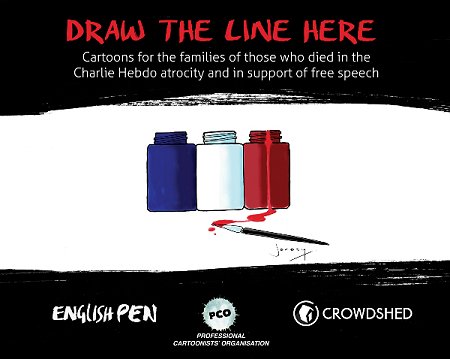
Draw the Line Here: Cartoonists respond to the Charlie Hebdo killings. Cartoons for the families of the victims of the Charlie Hebdo attacks, and in support of free speech.
English PEN is delighted to announce the publication of Draw The Line Here, a collection of cartoons drawn in response to the Charlie Hebdo attacks in Paris in January 2015.
The book is a collaboration between the Professional Cartoonists’ Organisation (PCO), Crowdshed, and English PEN. It features cartoons drawn by British artists in the days immediately after the attacks. The work of 66 cartoonists is featured, including Steve Bell, Dave Brown, Martin Rowson, Peter Brooke and Ralph Steadman.
 Proceeds from the book will be split equally between the fund for the victims of the Charlie Hebdo murders, and English PEN’s Writers at Risk programme.
Proceeds from the book will be split equally between the fund for the victims of the Charlie Hebdo murders, and English PEN’s Writers at Risk programme.
Production of the book was made possible by a crowd-funding campaign launched in February. Over 200 people pledged their support to the project, and will be receiving their copies of the book in the coming days.
Draw The Line Here includes a foreword by Libby Purves, patron of the PCO, who writes:
Some cartoons here are gentle, others savage; some merely encapsulate the bafflement and sadness of a world where mockery is met not with the proper response, a shrug, but with murder. Again and again the theme is of the fragility of the sceptical, laughing pencil: its simplicity and its splendour, the opposite of the vainglorious, meaningless squalor of the gun and the bomb.
Jo Glanville, director of English PEN, said:
We are extremely grateful to the PCO and to Crowdshed for choosing English PEN as a beneficiary of this project, and of course to all the cartoonists who have contributed to the book. By exercising their own right to freedom of expression, these artists are helping to defend the free speech of others.
The publication of this book could not be more timely. Sunday 3 May is World Press Freedom Day, the perfect time to stand in solidarity with Charlie Hebdo.
Draw The Line Here may be purchased online at: www.englishpen.org/campaigns/draw-the-line-here
Supporters to the Crowdfunding campaign will receive their copies in the coming days
Books cost UK £15.00 each. UK delivery is £2.00 and international delivery is £4.00.
# More information on website English PEN
fleursdumal.nl magazine
More in: - Book News, Art & Literature News, LITERARY MAGAZINES, PRESS & PUBLISHING, REPRESSION OF WRITERS, JOURNALISTS & ARTISTS
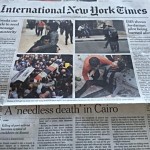 On 24th January 2015 Shaimaa el-Sabbagh, a poet and a member of the Socialist Popular Alliance Party, was marching to commemorate the hundreds of demonstrators that were killed during the Arab Spring uprising of 2011.
On 24th January 2015 Shaimaa el-Sabbagh, a poet and a member of the Socialist Popular Alliance Party, was marching to commemorate the hundreds of demonstrators that were killed during the Arab Spring uprising of 2011.
Shaimaa el-Sabbagh was shot in the back by riot police officers, while heading to Tahrir Square in Cairo to lay flowers there.
The Alliance Party said in a statement, that their only intention was to place flowers for of the fourth anniversary of the Jan. 25 revolution. Other demonstrators were also injured in the same demonstration.
Egyptian Government officials denied that the police had fired any shots.
At Sunday the funeral of the 31-year-old mother and poet, held in Alexandria, was attended by nearly 10,000 people.
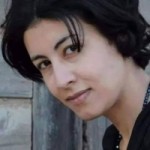 I am the girl banned from love in the squares …
I am the girl banned from love in the squares …
I stood in the middle of the street
and gathered in my hand the stars of the sky individually
And the sweat of the street vendors.
The voice of beggars
And the people who love God
as they damn this moment where the creatures of God approved
To crucifying Jesus naked in the crowded square
on the clock arms as it declared one at noon
I am the girl banned from saying no,
will never miss the dawn
Shaimaa al-Sabbagh
(From the poem: I’m the girl banned from attending the Christian religion classes, and Sunday mass. Translation by Maged Zaher)
# See Twitter Account Shaimaa el-Sabbagh
# Poems (in English) of Shaimaa el-Sabbagh on website: TIN HOUSE
fleursdumal.nl magazine
More in: - Archive Tombeau de la jeunesse, In Memoriam, REPRESSION OF WRITERS, JOURNALISTS & ARTISTS
Thank you for reading Fleurs du Mal - magazine for art & literature